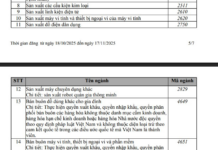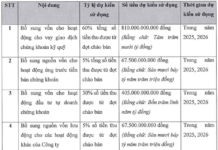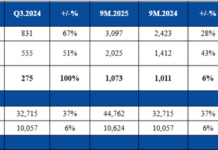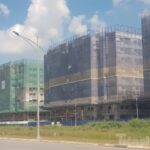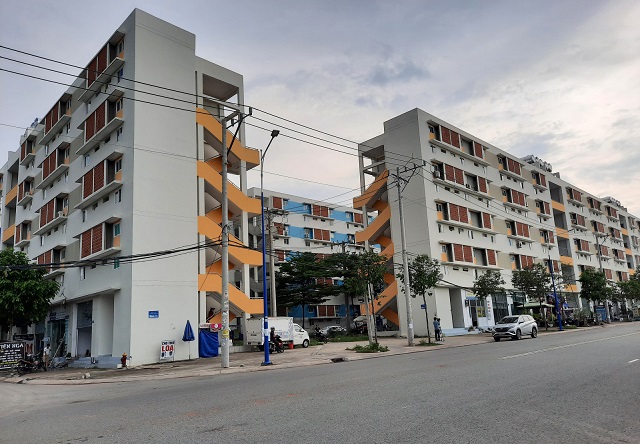
The plan states that ministries, ministerial-level agencies, Government agencies, and local administrations shall focus on directing the effective implementation of five tasks and solutions for social housing development.
|
The purpose of this plan is to thoroughly disseminate and effectively implement the tasks and solutions outlined in Directive No. 34-CT/TW, bringing about a significant change in the perception and actions of ministries, sectors, local authorities, and citizens regarding social housing development. It also aims to enhance state management efficiency, develop mechanisms and policies, and allocate resources for social housing development.
The ministries, ministerial-level agencies, Government agencies, and local administrations shall focus on effectively implementing five tasks and solutions: propagating and raising awareness of social housing development, reviewing and completing related policies and legal systems, improving state management efficiency, and coordinating the participation of agencies, organizations, and enterprises. They shall also focus on implementing support policies for eligible individuals and effectively mobilizing and utilizing resources for social housing development, as well as innovating management methods and models.
Regarding the propagation and awareness-raising of social housing development, the ministries, ministerial-level agencies, Government agencies, and local administrations shall organize the study, dissemination, and propagation of Directive No. 34-CT/TW and its guiding documents through various forms. This will enhance the awareness and responsibility of officials, party members, especially leaders of agencies, organizations, and enterprises, as well as the community, regarding the nature and significance of social housing development. It will be considered one of the key tasks in the country’s socio-economic development priorities.
Emphasizing the responsibility of leaders of agencies, organizations, enterprises, and the community in social housing development.
Focusing on providing leadership and guidance, promoting the role, and assigning responsibility to leaders in enhancing the quality and effectiveness of social housing development. Including social housing development indicators in the five-year and annual socio-economic development indicators of localities.
In terms of reviewing and completing policies and legal systems related to social housing, it is necessary to issue mechanisms and policies that facilitate and proactively allocate local budgets for investing in social housing construction projects. This includes carrying out compensation, site clearance, and resettlement support to obtain clean land for social housing, as well as investing in technical infrastructure outside the project scope and ensuring the synchronization of social infrastructure within and outside the project area.
Issuing specific mechanisms and policies for social housing for workers and developing housing for the armed forces. Improving the legal framework and facilitating mechanisms and policies to encourage the Vietnam General Confederation of Labour to participate in social housing development using trade union capital.
Promoting administrative procedure reform and creating favorable conditions for enterprises to invest in social housing development, enabling eligible individuals to easily access social housing. Significantly reducing the time required for administrative procedures related to investment, construction, business, buying and selling, management, and use of social housing.
Implementing mechanisms and policies to encourage the development of green social housing models that promote energy conservation, sustainability, and low carbon emissions.
Prioritizing the allocation of central and local state budget resources in a timely manner to ensure the achievement of social housing development goals. The state shall focus on developing social rental housing in urban areas using public investment capital.
Strengthening the socialization of capital sources for social housing development, especially from domestic and foreign enterprises. Reviewing and addressing difficulties and obstacles to effectively implement the preferential loan program for social housing.
Expanding capital sources for social housing development from local investment funds and foreign sources.
Encouraging the formation of investment funds, investment trusts, and joint ventures to implement social housing projects.
Allocating sufficient capital sources from the state budget to the Vietnam Bank for Social Policies and designated commercial banks for preferential lending for social housing development.
“Access to Information: Empowering Individuals in Social Housing Rentals and Purchases”
When purchasing, renting, or leasing social housing directly from investors or through real estate exchanges, individuals should have access to comprehensive information. They should be able to acquire their social housing at the announced price, without any additional fees or hidden costs.
“A New Social Housing Project for Ho Chi Minh City: 1,500 Homes to be Built”
Lê Thành Tân Kiên is the first social housing project to break ground in Ho Chi Minh City following the enforcement of land-related laws that came into effect on August 1st. This groundbreaking project sets a new precedent, offering affordable and quality housing options for those who need it most. With a focus on community and a commitment to accessibility, Lê Thành Tân Kiên is poised to become a beacon of hope and a testament to the power of inclusive development.
The Quest for Affordable Housing: Scrutinizing Two Social Housing Projects in Bac Ninh
The Bac Ninh province has recently added two new social housing projects to its 2024 inspection and audit plan. These projects include the Que Vo – Golden Park social housing project in the Que Vo industrial zone and a mixed-use development in Pho Moi, Que Vo town, comprising social housing, an electronics and home appliances supermarket, and a grocery store.












